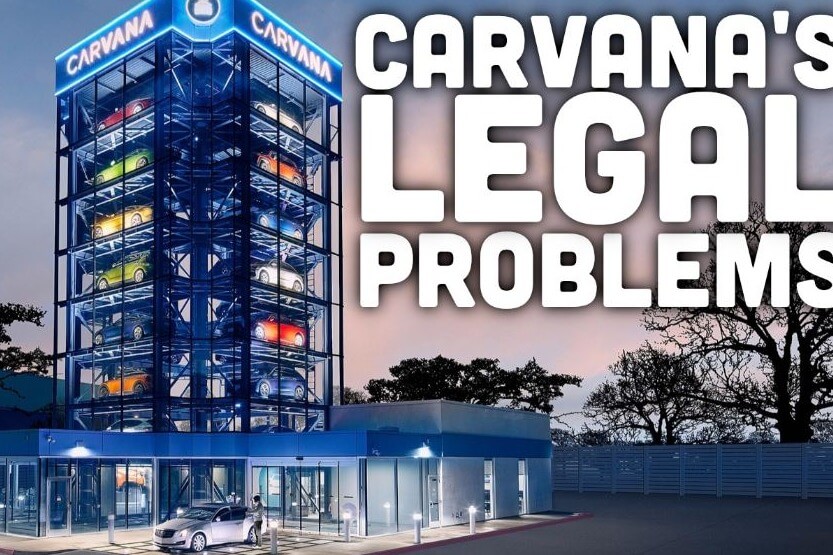Carvana, the online used car retailer known for its car-dispensing glass towers, is currently facing multiple legal battles.
The company’s business model of making car buying easier has come under scrutiny, with customers alleging unfair and deceptive practices.
Carvana has been hit with a class-action lawsuit over alleged months and months of delays in transferring vehicle titles, preventing consumers from being able to legally drive the cars they purchased.
In addition to the title transfer delays, Carvana has also faced fines and other disciplinary action in several states following consumer complaints.
The company has been accused of late vehicle registrations, which has resulted in customers receiving temporary tags that expire before their registrations are processed.
This has left some customers with expired tags and no way to legally drive their vehicles.
The lawsuits and complaints against Carvana have raised questions about the company’s business practices and whether they are truly making car buying easier for consumers.
As the legal battles continue, it remains to be seen how Carvana will address these issues and whether they will make changes to their operations.
Carvana Lawsuits Overview

Carvana, the online used car dealer known for its car-dispensing glass towers, has been facing a series of lawsuits and regulatory scrutiny in recent years. These legal issues have come from various entities, including consumers, judges, and the SEC.
One of the most notable lawsuits against Carvana is the class-action lawsuit filed in Pennsylvania over alleged late vehicle registrations. The lawsuit alleges that Carvana faced serious ongoing issues with documentation, registration, and title with many of its vehicles, resulting in unusually frequent temporary plates.
The lawsuit has been given the green light to proceed by a U.S. District Court judge.
Carvana has also faced fines and other disciplinary action in several states following consumer complaints. These complaints have included issues with vehicle condition, delivery, and financing. In response, Carvana has stated that it takes customer complaints seriously and works to resolve them quickly.
In addition to consumer lawsuits, Carvana has also faced legal trouble with the SEC. In 2019, the SEC launched an investigation into Carvana’s accounting practices, specifically its disclosure of vehicle inspection and repair policies. Carvana settled with the SEC in 2020, agreeing to pay a $1.7 million penalty without admitting or denying the charges.
Overall, Carvana’s legal issues highlight the challenges facing online car dealerships and the importance of transparency and accountability in the industry. While Carvana has stated that it is committed to resolving customer complaints and improving its practices, it remains to be seen how these legal issues will affect the company’s future.
Registration Issues
Carvana, an online used car retailer, has faced multiple legal battles in recent years, including class-action lawsuits over registration issues. The following sub-sections will discuss some of the most common registration issues that have been reported by Carvana customers.
Temporary Tags Problem
One of the most common complaints about Carvana is the delay in receiving temporary tags. According to a class-action lawsuit filed in Pennsylvania, Carvana failed to “timely register” cars as it promised, sometimes for a period “exceeding two years.”
This delay has caused significant inconvenience for customers who are unable to legally operate their vehicles without the temporary tags.
Permanent Registration Delay
Another issue that Carvana customers have reported is a delay in receiving permanent registration. According to a class-action lawsuit filed in Arizona, Carvana “failed to timely transfer vehicle titles and register vehicles with the Arizona Department of Transportation.” As a result, customers have been unable to obtain permanent registration for their vehicles, even months after purchasing them.
Title Transfer Issues
Carvana customers have also reported issues with title transfers. According to a class-action lawsuit filed in Pennsylvania, Carvana “still has not provided Plaintiff permanent registration as it was required to do” pursuant to its contractual agreement with the consumer.
The lawsuit claims that Carvana has failed to transfer titles in a timely manner, causing significant inconvenience for customers.
In conclusion, Carvana has faced numerous legal battles over registration issues, including delays in receiving temporary tags, permanent registration, and title transfers. These issues have caused significant inconvenience for customers and have resulted in class-action lawsuits against the company.
Customer Complaints

Carvana, an online used car dealer, has faced numerous complaints from customers over the years. These complaints range from issues with the quality of used cars to problems with sales and delivery documents. In this section, we will explore some of the most common customer complaints about Carvana.
Complaints About Used Cars
One of the most common complaints about Carvana is related to the quality of the used cars they sell. Customers have reported receiving cars with significant mechanical issues that were not disclosed in the inspection reports.
Some customers have also reported receiving cars with cosmetic damage that was not disclosed in the listing. These issues have left many customers frustrated and feeling like they were misled by Carvana.
Complaints About Sales and Delivery
Another common complaint about Carvana is related to sales and delivery documents. Some customers have reported that Carvana failed to deliver the car they purchased within the promised timeframe, leaving them without transportation.
Others have reported frustration with the paperwork process, including delays in receiving titles and registration documents. These issues have left some customers feeling like they were not properly informed about the sales and delivery process.
In response to these complaints, Carvana has implemented a number of changes to improve the customer experience.
For example, they have increased the number of inspections they perform on each car before selling it and have made changes to the sales and delivery process to ensure that customers receive their cars in a timely manner. Despite these changes, some customers continue to report issues with Carvana’s practices.
Overall, it is clear that Carvana has faced a number of complaints from customers over the years. While the company has made efforts to address these issues, it is important for potential customers to be aware of the potential risks associated with buying a used car online.
By doing their research and carefully reviewing the inspection reports and sales documents, customers can help protect themselves from potential wrongdoing by Carvana or any other used car dealer.
Legal Consequences

Carvana has faced several legal consequences following consumer complaints. The company has been fined and disciplined in several states, and it is also facing multiple legal battles, including a class-action lawsuit. In this section, we will discuss some of the legal consequences that Carvana has faced.
SEC Probation
In 2019, Carvana was put on probation by the Securities and Exchange Commission (SEC) following an investigation into the company’s initial public offering (IPO). The investigation found that Carvana had violated certain SEC rules and regulations, and as a result, the company was required to pay a $1.7 million penalty and was placed on probation for two years.
Bench Warrant and Arrest
In 2022, Carvana was issued a bench warrant after the company failed to appear in court for a lawsuit filed by a consumer. The lawsuit alleged that Carvana had engaged in unfair and deceptive practices, including misrepresenting the condition of the vehicles it sold. The bench warrant was later lifted after Carvana agreed to settle the lawsuit.
In another case, a former Carvana employee was arrested for allegedly stealing customer information and using it to purchase vehicles from the company. The employee was charged with several crimes, including identity theft and fraud.
Carvana has also faced hot water with law enforcement in several states, including Arizona, where the company operates a car vending machine. In 2018, the Arizona Department of Transportation conducted an investigation into Carvana’s operations and found that the company had violated several state laws and regulations.
Overall, Carvana’s legal troubles highlight the importance of transparency and compliance in the automotive industry. The company has since taken steps to address some of the issues raised by regulators and consumers, but it remains to be seen how effective these measures will be in preventing future legal problems.
Company’s Response
Denial of Wrongdoing
Carvana Co. has denied any wrongdoing in relation to the class action lawsuits and allegations made against the company. In an official statement, Carvana stated that it believes the lawsuits are without merit and that it will vigorously defend itself against them. The company maintains that it has always acted in accordance with all applicable laws and regulations.
Laying Off Employees
In response to the financial challenges the company has faced, Carvana Co. has announced that it will be laying off a number of employees. The company has stated that this decision was made as a result of a contractual obligation to reduce costs and improve profitability. Carvana has emphasized that it values its employees and that the decision to lay off workers was a difficult one.
Carvana has also announced that it will be restructuring its operations in order to better position itself for future growth. The company has stated that it remains committed to providing customers with the best possible experience when buying and selling cars online.
Despite the challenges that Carvana has faced in recent months, the company remains optimistic about its future prospects. With a strong commitment to innovation and customer service, Carvana is confident that it will continue to be a leader in the online car sales industry.
Involvement of Other Parties

Role of North Carolina Attorney General
Carvana has faced legal issues in multiple states, including North Carolina. In 2022, the North Carolina Attorney General’s office launched an investigation into Carvana’s business practices. The investigation was aimed at determining whether Carvana’s advertising and sales practices were in violation of North Carolina’s consumer protection laws.
The North Carolina Attorney General’s office alleged that Carvana had made false and misleading statements about the condition of its vehicles, failed to disclose damage to vehicles, and failed to provide consumers with accurate information about the history of the vehicles they were purchasing.
The investigation ultimately resulted in a settlement between Carvana and the North Carolina Attorney General’s office in which Carvana agreed to pay $1.7 million in restitution to affected consumers.
Shareholder’s Perspective
Carvana’s legal troubles have also been of concern to its shareholders. In 2021, a class-action lawsuit was filed against Carvana on behalf of shareholders who alleged that Carvana had made false and misleading statements about its business and financial prospects.
The lawsuit alleged that Carvana had misled investors about the quality of its vehicles, its ability to transfer vehicle titles, and its compliance with state laws.
The lawsuit also alleged that Carvana had failed to disclose significant risks to its business, including the potential for regulatory investigations and lawsuits. The lawsuit sought damages for shareholders who had purchased Carvana stock between August 2019 and September 2020. The case is still ongoing.
Overall, Carvana’s legal issues have raised concerns among shareholders about the company’s ability to operate in compliance with state laws and regulations. As a result, the company’s stock price has been volatile, with some investors choosing to sell their shares in the company.
State Laws
Carvana’s legal issues also highlight the challenges that online used car dealers face in complying with state laws and regulations. Each state has its own laws regarding vehicle sales, including requirements for vehicle titles, registration, and disclosure of vehicle history.
Carvana has faced allegations that it has failed to comply with these laws, resulting in delays in transferring vehicle titles and other legal issues. The company has stated that it is working to improve its compliance with state laws and regulations, but it remains to be seen how successful these efforts will be in the long term.
To Summarize
Carvana, a popular online used car dealer, has been the subject of several lawsuits in recent years. These lawsuits have alleged various issues related to the company’s business practices, including misleading statements, licensing disputes, and delays in transferring vehicle titles.
One of the most significant lawsuits against Carvana was a class-action lawsuit filed by investors who purchased Carvana securities between May 6, 2020, and June 24, 2022. The lawsuit alleged that Carvana made false and misleading statements about its documentation, registration, and title issues with many of its vehicles, resulting in unusually frequent temporary plates being issued.
As a result, Carvana’s stock price dropped significantly, and the company agreed to pay $850,000 to settle the lawsuit.
In addition to the securities lawsuit, Carvana has also faced a class-action lawsuit from customers who alleged unfair and deceptive practices related to delays in transferring vehicle titles. The lawsuit alleged that Carvana routinely issued multiple temporary license tags to customers awaiting the transfer of their permanent registration, in violation of state laws.
Despite these lawsuits, Carvana continues to operate and expand its business. The company has implemented changes to its business practices, such as improving its documentation and registration processes, to address some of the issues raised in the lawsuits. However, it remains to be seen whether these changes will be sufficient to prevent further legal action against the company in the future.




![Is Carvana Legit? [Is It a Ripoff? Complaints, Pros and Cons] is carvana legit](https://roadsumo.com/wp-content/uploads/2022/03/is-Carvana-legit-150x150.jpg)
![Honda Brake Fluid [What You Need to Know] Honda Brake Fluid](https://roadsumo.com/wp-content/uploads/2022/02/Honda-brake-fluid-150x150.jpg)



